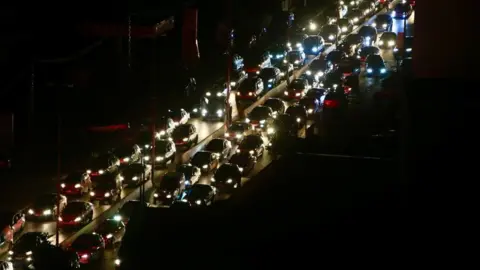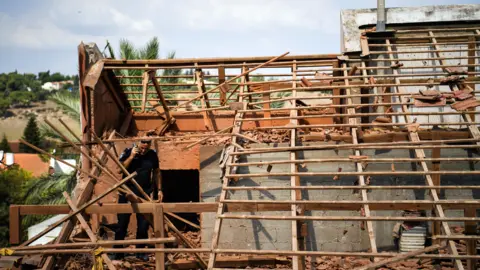Israeli airstrikes kill 492 in Lebanon

At least 492 people have been killed in heavy, large-scale Israeli airstrikes targeting Hezbollah in Lebanon, the country’s health ministry said, in the deadliest day of conflict in nearly 20 years.
Thousands of families also fled their homes as the Israeli military said it struck 1,300 Hezbollah targets in an operation aimed at destroying infrastructure the armed group had built since the 2006 war.
Hezbollah meanwhile fired more than 200 rockets toward northern Israel, according to the army. Rescuers said two people were injured by shrapnel.
World powers are calling for restraint as both sides appear to be moving ever closer to all-out war.
The Lebanese Health Ministry said 35 children and 58 women were among the dead, while 1,645 others were injured.
The agency did not say how many of the casualties were civilians or combatants.
Health Minister Firass Abiad said thousands of families had also been displaced by the strikes.
UN Secretary-General António Guterres expressed alarm at the escalating situation and said he did not want Lebanon to “become another Gaza”.
President Joe Biden said the United States was “working to de-escalate the situation in a way that allows people to return home safely,” while the Pentagon announced it was sending “a small number” of additional troops to the Middle East “out of an abundance of caution.”
Nearly a year of cross-border fighting between Israel and Hezbollah, sparked by the Gaza war, has killed hundreds of people, mostly Hezbollah fighters, and displaced tens of thousands on both sides of the border.
Hezbollah has said it is acting in support of Hamas and will not stop until a ceasefire is established in Gaza. Both groups are backed by Iran and considered terrorist organizations by Israel, the United Kingdom and other countries.
The Pentagon said it was sending “a small number” of additional U.S. troops to the Middle East amid a growing crisis.
“In light of the heightened tensions in the Middle East and as a precautionary measure, we are sending a small number of additional U.S. military personnel to augment our forces already present in the region,” Pentagon spokesman Maj. Gen. Pat Ryder said in a briefing with reporters.
He declined to answer further questions about the details.
Lebanese media said the first wave of Israeli airstrikes began around 06:30 local time (0330 GMT) on Monday.
“It was horrible, the missiles were flying over our heads. We were woken up by the sound of the bombing, we didn’t expect that,” said one woman.
Dozens of towns, villages and open areas were targeted throughout the day in the districts of Sidon, Marjayoun, Nabatieh, Bint Jbeil, Tyre, Jezzine and Zahrani in southern Lebanon, as well as in the districts of Zahle, Baalbek and Hermel in the eastern Bekaa Valley, according to the official National News Agency (NNA).
In the evening, it was reported that a building in the Bir al-Abed neighborhood in the southern suburbs of the capital, Beirut, was hit by several missiles.
Lebanese security sources said the strike targeted Hezbollah’s top commander in southern Lebanon, Ali Karaki, but it was unclear whether he was killed. Hezbollah’s press office said Karaki was “fine” and had “moved to a safe place.”
From the south towards Beirut, roads were congested as people desperately tried to leave amid the bombardment and after receiving audio and text messages from the Israeli military warning them to immediately move away from buildings where Hezbollah was storing weapons.
A family of four on a motorbike spoke to the BBC in Beirut during a brief stopover en route to the northern city of Tripoli. “What do you want us to tell you? We had to flee,” said the worried father.
Information Minister Ziad Makary said his ministry had received an Israeli phone call urging it to evacuate its building in Beirut. He insisted, however, that his ministry would not bow to what he called “psychological warfare.”
Prime Minister Najib Mikati, for his part, said at a cabinet meeting: “The continued Israeli aggression against Lebanon is a war of extermination in every sense of the word.”
“We are working as a government to end this new Israeli war and avoid falling into the unknown,” he added.
 EPA
EPAThe Israel Defense Forces (IDF) said in a statement Monday night that its aircraft carried out strikes on about 1,300 Hezbollah “terrorist targets” in southern Lebanon and the Bekaa Valley, where it said rockets, missiles, launchers and drones were hidden.
“We are primarily targeting the combat infrastructure that Hezbollah has been building for 20 years. This is very important,” IDF Chief of Staff Lt. Gen. Herzi Halevi told commanders in Tel Aviv.
“Ultimately, it’s all about creating the conditions for northerners to be able to return home.”
IDF spokesman Rear Admiral Daniel Hagari said videos from southern Lebanon showed “large secondary explosions caused by Hezbollah weapons stored inside buildings.”
“It is likely that some of the casualties were caused by these secondary explosions,” he added.
Israeli Prime Minister Benjamin Netanyahu urged the Lebanese people to “get out of danger immediately.”
“For too long, Hezbollah has used you as human shields. It has placed rockets in your living rooms and missiles in your garages,” he said. “To defend our people from Hezbollah’s strikes, we must remove these weapons.”
A senior Israeli military official insisted that the Israeli military was currently “focusing solely on the Israeli air campaign” after being asked by reporters whether a ground invasion of southern Lebanon was imminent to create a buffer zone.
The official said Israel had three goals: reducing Hezbollah’s ability to fire rockets and missiles at the Lebanon-Israel border, pushing its fighters back from the border and destroying infrastructure built by Hezbollah’s elite Radwan force that could be used to attack Israeli communities.
Hezbollah has not commented on Israeli allegations that it hid weapons in homes, and its press office had reported only one fighter killed as of Monday evening.
But in a sign that it is unlikely to back down, it said it had responded to “attacks by the Israeli enemy” by firing barrages of rockets at several Israeli military bases in northern Israel, as well as at a weapons manufacturing plant in the coastal region of Zvulun, north of the city of Haifa.
The Israeli military said 210 projectiles crossed the border from Lebanon in the evening, and an unspecified number landed in the Lower Galilee and Upper Galilee regions, Haifa and the neighboring areas of Carmel, HaAmakim and Hamifratz, and in the occupied Golan Heights.
 Reuters
ReutersA house was seriously damaged by a rocket in Givat Avni, Lower Galilee.
One resident, David Yitzhak, told the BBC that he, his wife and six-year-old daughter were unharmed because they had managed to slip behind the solid door of the house’s secure room seconds earlier, when a warning siren sounded.
“There is a meter between life and death,” he said.
The Israeli ambulance service said it treated two people injured by shrapnel in the Lower and Upper Galilee regions, and that another person was injured while rushing to shelter.
On Sunday, Hezbollah launched more than 150 rockets and drones across the border, while Israeli warplanes struck hundreds of targets in southern Lebanon.
Hezbollah remains a powerful force, though weakened by what Israel’s defense minister described as “the most difficult week” for the group since its creation.
On Tuesday and Wednesday, 39 people were killed and thousands more injured after thousands of pagers and walkie-talkies used by Hezbollah exploded. On Friday, Hezbollah said at least 16 members, including senior members of its elite Radwan force, were among 45 people killed in an Israeli airstrike in southern Beirut.
Speaking at a funeral on Sunday, Hezbollah deputy leader Naim Qassem said the group would not be deterred.
“We have entered a new phase,” he said, “whose title is the open battle of judgment.”
On the streets of Beirut, one young man told the BBC he was “very afraid of the escalation of the war” because it “would cause a lot of disasters, it would stop students from going to university”.
But another man was defiant and said: “We are not afraid, we must stand, we must defend ourselves.”





